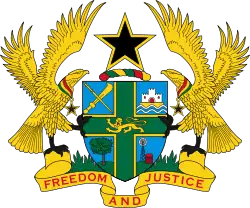| |||||||||||||||||||
| Results | |||||||||||||||||||
|---|---|---|---|---|---|---|---|---|---|---|---|---|---|---|---|---|---|---|---|
| |||||||||||||||||||
 |
|---|
| Constitution |
|
|
A constitutional referendum was held in Ghana on 31 January 1964. The proposed amendments to the constitution would turn the country into a one-party state and increase the powers of President Kwame Nkrumah and make him president for life. With results showing that an implausible 99.91% of voters supported the amendments, the referendum was accused of being "obviously rigged".[1] Voter turnout was reported to be 96.5%.[2]
Results
| Choice | Votes | % |
|---|---|---|
| For | 2,773,920 | 99.91 |
| Against | 2,452 | 0.09 |
| Total | 2,776,372 | 100 |
| Source: African Elections Database | ||
Aftermath
Following the successful passage of the constitutional amendments, the country became a one-party state with the Convention People's Party as the sole legal party (though the country had essentially been a one-party state since independence in 1957). Nkrumah became president for life of both nation and party, with greatly expanded powers; he could now remove members of the Supreme Court at his discretion. In effect, the amendments transformed Nkrumah's regime into a legal dictatorship. Elections were scheduled to be held under this system in 1965, but were cancelled shortly beforehand, with Nkrumah appointing MPs instead. However, Nkrumah was overthrown in a coup in February 1966, the CPP was dissolved, and the constitution suspended. Multi-party politics was restored by the time of the next elections in 1969.
References
- ↑ Seth Anthony (1969) "The State of Ghana", African Affairs Vol. 68, No. 273, pp337–339
- ↑ Milutin Tomanović (1965) Hronika međunarodnih događaja 1964, Institute of International Politics and Economics, p240 (in Serbo-Croatian)